- Home
- William Goldman
Adventures in the Screen Trade Page 7
Adventures in the Screen Trade Read online
Page 7
(Remember the "almost," because now I have to talk about the handling of story material, something that may not seem germane but I think may prove to be.)
There is a famous, probably apochryphal, story about a Broadway actor who had a tiny blink of a part in A Streetcar Named Desire. He appeared only at the very end, and then to help cart Blanche away. Someone asked him, before the play opened, what Streetcar was about. And this actor replied, "It's about a man who takes a woman to a booby hatch."
All right, All Night Long is the story of George and his mid-life crisis--but that's only because the writer wrote it that way. Gone With the Wind is only about Scarlett and Rhett because that was the creator's decision, but you could have told about the Civil War through the eyes of Ashley Wilkes, in which case Scarlett would have been of secondary importance and Rhett nothing much at all. Or you could have done the whole thing centering on the Tarleton twins, minor roles who are with Scarlett at the beginning of the story, in which case everybody major now disappears.
Look, the story of All Night Long could have made a terrific Jane Fonda picture. A noble, decent wife whose husband leaves her but she goes on alone.
If you'd had Travolta, it becomes the son's story--a strong drama about a young man in love and on the brink of manhood who finds himself in dangerous competition with his father over the same object.
The fireman would have been great for Robert Duvall--a tough, expert guy in a dangerous line of work who finds his wife is sleeping with another man, and how does his macho soul come to grips with that?
Or easiest of all: Cheryl's story--it would make a super sex comedy. Start it this way: She's cooking up some concoction in her kitchen, fumbling and funny, when suddenly there's a flash fire and she's saved by this gorgeous fireman. Dissolve. They marry. He's still gorgeous, but not only is he crummy to her, he's away all night long. Enter this handsome teen-ager to paint the bedroom, he's confused, insecure--boom, they're in the sack. Only next comes something she hadn't counted on: He's got a real crush on her. Madness: She's a married lady much older than he is. Now another boom: The kid's father finds out and says, look, stop playing around with my son. She says sure, and the next thing you know, she's playing around with the father. She's in the sack with him and the son comes knocking at the door--instant farce. Men are flying in one door and out the other, with Cheryl at the center, trying to handle her husband with one hand, the kid with the other, and the kid's father with any parts of her body left over.
As a matter of fact, not only would this make a sex comedy, it would be a perfect part for Barbra Streisand.
And what is that?
Streisand's persona was pretty much outlined with Funny Girl: This is a lady who dominates. She wins every scene. And she may not be classically beautiful, but her energy and drive are enough to captivate the most beautiful of men--O'Neal, Sharif, Redford, Kristofferson. She can do musicals, she can do farce, she can do romantic comedy. Just let her dominate and you're home.
Remember Up the Sandbox?
It's maybe her most telling film performance, and also her sole disaster. What did she play? A put-upon, forlorn housewife with daydreams that don't quite work. Why did it fail? Because she may have been acting, but she wasn't acting her role. And what was the part of Cheryl? Nothing else but a put-upon, forlorn housewife with daydreams that don't quite work.
Why didn't the studio alter the film, once they'd shut down, to accommodate their star? And why didn't they add a bunch of musical numbers? (Cheryl, after all, is a songwriter in the story.) Because Barbra Streisand wanted to play Cheryl as written. (She was perfectly fine, by the way.)
So what the studio had done was to take a frail, three-million-dollar film and turn it into a fifteen-million-dollar film that was a total disaster and that, when you add in prints and advertising, probably lost them twenty million dollars.
Because what they were doing, in essence, was to pay Barbra Streisand four and a half million dollars not to play Barbra Streisand.
And if the same thing happened today, they'd do it all over again....
Directors
Some of my best friends are directors....
P.S.: Everybody knows directors are important. In much of what follows, directors appear constantly.
Suffice it here to say that they are good and bad, helpful and subverting, envious and supportive. Whatever they are, I feel screenwriters must support them, because directors are under assault from all quarters at all times.
Over the years I have met and worked with a dozen prize-winning American directors, and there is not one whose "philosophy" or "world view" remotely interests me. The total amount of what they have to "say" cannot cover the bottom of even a small teacup. (More on that later.)
That they can survive the sandhoglike physical demands of the job fills me with awe and admiration. The best of them are wonderful storytellers. And those best do one thing superbly well: They help.
Everybody.
Producers
Producers may just be the least understood figures in the industry.
Part of this is due to terminology. Once, a movie was simply "produced by" so-and-so. No more. A simple reading of today's paper shows that now there are people who "present" movies. There are "executive producers," "associate producers." There are "executives in charge of production." One recent film had two "executive producers," two "associate producers," and one "executive in charge of production." Now, you may well ask, what in the world do all these terms mean?
I can answer in total honesty: I haven't the foggiest.
Some producers are simply money men. They arrange for, or come up with, the cash, and they take some kind of billing (and fee) for their efforts.
Others are packagers. They option a piece of material, interest an "element," make a deal with a studio, and head for points west. They literally will have nothing more to do with the picture than that.
Others are in that oldest of Hollywood traditions, the "son-in-law" business. The term is still valid, but with the collapse of the studio system, there aren't that many actual relatives by marriage on the payroll anymore. But there are lots of brothers or husbands. You want a star, he makes a deal that includes his spouse. The spouse gets billing.
Most often now, they are agents or ex-agents who are now the star's partner. In the former case, let's say an agent has a hot book; he'll make a deal with the studio to the effect of, sure, you can have it, but you'll have to pay me a little something extra or I'll go across the street. So they become "executive producers" or some other title more to their liking.
On Butch Cassidy, for example, the original material was purchased by Fox for Paul Monash. Monash was the producer of the film.
Then, when Paul Newman was signed, along came John Foreman. Foreman had been Newman's agent for years, had left the agency to become his business partner. In order to get Newman, guess what happened? Foreman became the "producer" and Monash suddenly was "executive producer." And what was their contribution to the film?
I still haven't the foggiest, because Butch was directed by George Roy Hill, and on a George Roy Hill film, George is the giant ape. Because of his vast talent, his skill at infighting, his personality, he runs the show. He has been known to banish writers from the set if he finds them intrusive; the same with producers.
None of this is meant to denigrate Monash or Foreman, who, I suspect, were terribly important to the finished product. What I'm saying is this: Screenwriters don't--at least this is true for me--deal all that much with producers. They hire us, we have meetings, they make suggestions, I go off and rewrite--that kind of thing. I have worked for some famous producers--Joseph E. Levine, Robert Evans--but the crucial aspect of their work does not often come in contact with mine.
One other reason that there is a lack of understanding about the producer's function is this: They have no effective governing body. (There is a guild, but it is not powerful or cohesive in the sense, say, that the Directors Guild operate
s.) If there were a strong producers' union, the buy-offs that permeate the trade might be eliminated. You can't suddenly decide, for example, to make someone who is close to the star an "assistant director." Not unless he's already an assistant director; there's a whole program of training that must be successfully completed. Or you can't make someone suddenly the "executive writer"--there's no such thing.
But as things now stand, anyone can walk around saying, "Yes, I'm a producer, I just bought a book." (Probably not adding that he just bought it at Brentano's.) In any case, the proliferation of terminology is something that drives quality producers up the nearest wall.
And there are quality producers.
If they are very smart, they are flexible enough to realize that their specific duties vary with the particular film. Sometimes they're on the floor constantly; at other times, if a production is running smoothly and on schedule, they'll stay away. But if their individual requirements alter more from one job to another than, for example, the cinematographer's, there are certain definites--
--their job is to get the picture made--
--and more often than not, they are the first ones on a project, and years later, after the selling has been done, they are the last ones off.
There is only one producer today to whom no laws apply, and that is George Lucas. Lucas is our Walt Disney: His name indicates a certain kind of subject matter and guarantees success. All the rest have to scuffle and suffer.
And wait.
Waiting is the curse of the producer's profession.
To illustrate this, it may be helpful now to zero in on one particular project, and I have chosen the Zanuck-Brown production of The Verdict, which is shooting today in New York City.
There is no one best producer. But it would be very hard to make a list of the top half dozen and not include the team of Richard Zanuck and David Brown. They make an interesting and unusual team. Longevity, for example: As both studio executives and producers, they have been together for going on a quarter century.
And they can scarcely be more different (except for the fact that they both are Stanford graduates). Brown, a native New Yorker, is sixty-five, gray-haired, and courtly. He comes to movies from the literary end. After receiving a Master's in journalism from Columbia, he began an editorial career. He was editor in chief of Liberty, managing editor of Cosmopolitan--the same magazine where his wife, Helen, has been so successful for the last decade. He was brought into the picture business by Darryl F. Zanuck, eventually rising to the post of executive vice president/creative affairs at 20th Century-Fox.
Richard Zanuck grew up at the studio. His father, the legendary Darryl F., was king there for close to thirty years. He produced his first success, Compulsion, when he was but twenty-four. At thirty-four, he became president of Fox, the youngest corporate head maybe ever. During his eight-year reign, three Fox films won Best Picture awards--The Sound of Music, Patton, and The French Connection.
But we already know what happens to all studio executives, and in the early seventies, Zanuck-Brown became independent producers: They "went indie-prod"--Hollywoodese for being canned.
In the last decade, they have had their share of misses, but three of the hits, The Sting, Jaws, and Jaws II, are among the few movies in history to have taken in more than a hundred million dollars. Between them, there is precious little they don't know about the picture-making process.
The Verdict was a novel--not a well-known one--by Barry Reed. From the moment they acquired it, they were surprised to find a remarkable amount of star interest in their relatively obscure book. Performers such as Roy Scheider, William Holden, Frank Sinatra, Cary Grant, Dustin Hoffman, all let it be known in one way or another that they were aware of the project and please keep in touch.
The reasons behind the flurry of interest are, with hindsight, not hard to figure. The Verdict is a courtroom drama, and the main character, Galvin, is terribly appealing: He's a washed-up Boston Irish lawyer, a kind of burnt-out case, a boozer, a womanizer who, through his involvement with the trial, finds, if you will, redemption.
The Verdict also had one other thing going--a sensational and important subject matter: The trial is about medical malpractice.
It's at this point in a production--with or without any star interest--that a producer faces what is often the make or break decision: selecting who is going to write the script, who is going to direct. This is also the last time that a producer has total control. Whatever their vision may be, it is now bound to alter. From here on, it's no longer "their" movie, it's "ours."
Producers tend to keep lists. If they decide to go for a director first (which Zanuck-Brown did), they get out their trusty directors list and begin to ask questions. Who is available? Who is "helpful" (in the studio's eyes) in moving the project closer to actuality? Who can they stand? Who can they get to? And, most important of all: Who is right for the project?
Zanuck-Brown went after Arthur Hiller (Love Story, The Americanization of Emily). Hiller is much in demand. He's an excellent shooter, even-tempered, reasonable. And known in the business as a man who will deliver the script he carries onto the floor. Hiller was fascinated with The Verdict and immediately came on board.
Zanuck-Brown did not have to go after a writer next, because a writer came after them--the playwright David Mamet. Although his reception on Broadway has been limited, Mamet has had sensational success both Off-Broadway and in regional theatres all around the country.
He had not done much, if any, movie work to this point, but Zanuck-Brown knew him well; in fact, they had tried to get him to work on an earlier project of theirs that already had a director. Not only did Mamet not do this earlier piece, he had been so convincing that the material was fatally flawed that the director quit.
Now, you may think that this experience might have made Zanuck-Brown a wee bit reluctant to try Mamet again, but the reverse was true: Mamet had worked for weeks on the other piece and, at his own insistence, had taken no money. So they knew that when Mamet called and said he wanted to write The Verdict, they were dealing with not only a talent but a talent of proven integrity.
Hiller wanted Mamet. Zanuck-Brown wanted Mamet. Mamet was hired.
And that's when the waiting begins for the producer. All producers (Sam Spiegel may be the exception) try and have a bunch of projects moving forward concurrently. Because once a writer starts to write or a script is sent to a star, there's not a goddam thing to do but wait for the phone to ring. You can't constantly call someone who's doing a screenplay for you and beat around the bush before coming out with the biggie: When will you be done, when can we have it? When I do a job, I know the producer's going mad, I feel that pressure, and it's death when they call. All the up-front bullshitting about how the Knicks are doing or did you see Dream Girls is agony. And even though they say, "Oh, by the way, not important or anything, but how's it coming?"--of course they don't mean "How's it coming?"--you're bound to say, "Terrific, better than I'd hoped," because if you said, "Horribly, I'm fucking it up beyond repair," everyone would have cardiac arrest. When's it coming? is the subject not under discussion. All a phone call like that does is increase your insecurity and slow everything down.
Which is why good producers don't call. In the case of The Verdict, the wait was not agonizing: Mamet delivered promptly and skillfully.
Only Zanuck-Brown didn't like the screenplay. Brown says, "It was written in that terse, dramatic style that directors and actors love and that producers and executives rarely understand."
Only Hiller, the director, didn't like it either. They all felt it just didn't work. Hiller got off the picture. So instead of having a director and a writer, Zanuck-Brown now had no director and a script they felt deviated too much from the book they had purchased.
Now they went after another top writer, Jay Presson Allen (The Prime of Miss Jean Brodie, Prince of the City). They met with Allen, went over what they wanted, point by point.
Allen delivered her script and
they loved it: It was exactly what they wanted.
Enter Robert Redford.
Redford was looking at some houses in Connecticut, and one of the places he saw was Jay Presson Allen's. He also saw a copy of The Verdict, asked if he might read it. Allen, who may have felt Redford was interested in directing, gave him the copy.
Redford then called Zanuck and Brown and asked if they might talk. When a star of Redford's magnitude requests a meeting, usually it can be arranged.
Redford told them he was really interested in The Verdict.
Ecstasy.
But then he said he liked the subject matter, not Jay Allen's script. He thought writer-director Jim Bridges (The China Syndrome, Urban Cowboy) would be good for the material.
Out Allen, in Bridges.
And the waiting began.
Bridges met with Redford, went off and wrote his own screenplay based on The Verdict.
Redford didn't like it.
Bridges went away and wrote another version.
Redford didn't like it either.
Months are going by. Zanuck-Brown have negotiated a deal with Redford, which was finished but unsigned. Redford was announced for the project: The Fox brochure of its upcoming films listed him as the star. It was set--but it wasn't set-set.
On and on, the waiting.
Because of his childhood, because he was privy to the inner workings of studios in the Golden Era, waiting may be more frustrating for Zanuck than for any other producer. He says, "I remember as a kid, under my father's desk, under the glass on the top of his desk, was a big chart. And it had everybody that was under contract there. All the producers, and the directors, and the writers and actors and actresses. And it was so simple. I used to sit in on casting meetings, which would take all of about ten minutes. Not only casting, but putting the whole picture together. He would say, 'Well, we've got Julian Blaustein as producer, he's available next week. Put him with Henry Hathaway, he'll direct. And we've got Tyrone Power, he's going to finish his picture, give him a week off. And Betty Grable.' And that was the end of it. Nobody said, 'Can we make a deal with him?' They already had a deal. I'm not asking for a return to the old days. But some goddamned good pictures were made with that system."

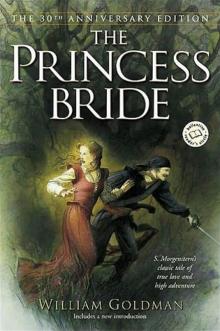 The Princess Bride
The Princess Bride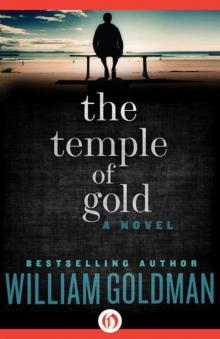 The Temple of Gold
The Temple of Gold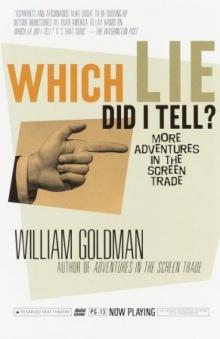 Which Lie Did I Tell?: More Adventures in the Screen Trade
Which Lie Did I Tell?: More Adventures in the Screen Trade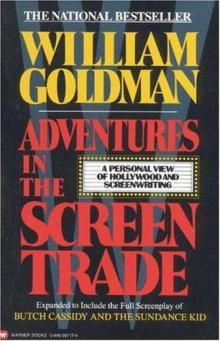 Adventures in the Screen Trade
Adventures in the Screen Trade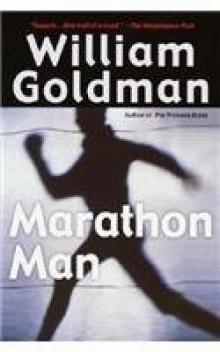 Marathon Man
Marathon Man The Novels of William Goldman: Boys and Girls Together, Marathon Man, and the Temple of Gold
The Novels of William Goldman: Boys and Girls Together, Marathon Man, and the Temple of Gold Boys and Girls Together: A Novel
Boys and Girls Together: A Novel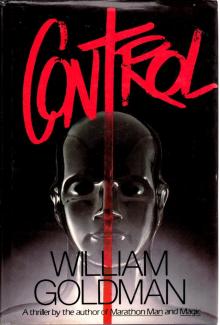 Control
Control The Novels of William Goldman
The Novels of William Goldman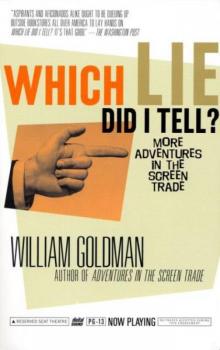 Which Lie Did I Tell?
Which Lie Did I Tell? Boys & Girls Together
Boys & Girls Together